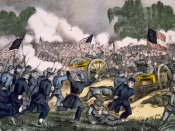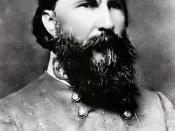The Battle of Gettysburg in 1863 is looked upon even today as one of the greatest and most defining moments of the American Civil War. Due to the continual threat of Union armies in Virginia in 1863, Robert E. Lee, General of the Confederate Army decided to invade the North in an attempt to push Union armies out of the South. In late July of that year, Lee led the Army of Northern Virginia through Pennsylvania, hoping to reach Washington. Yet unexpectedly at the small town of Gettysburg, Lee's men encountered the Union army, led for the first time by the newly appointed General George Meade. What eventuated was three days of bloody warfare, with one of the highest recorded casualty counts of the Civil War. Ultimately, Lee's Confederate soldiers were not successful, being forced back to the South just three days after the battle had begun. Failures in intelligence and lack of information, conflicting opinions of the Confederate lieutenants, and the ultimate failure of "Pickets Charge" can all be accountable for the Confederacy's defeat at Gettysburg.
The end of the battle marked an important milestone of the Civil War, with the South never to invade Northern soil again and thereafter, the ultimate result of the war increasingly favored the Union. Although the war continued for almost two years after this great conflict, many historians note the Battle of Gettysburg as the 'high water mark of the confederacy.' (Haugen, David M., 2002, The Civil War Primary Sources p.65) Never again did Lee attempt an invasion of the north, and the confederacy never recovered from its losses at Gettysburg.
Failure in intelligence and the lack of information provided to Lee regarding the strength and location of the Union army contributed greatly to the losses of the Confederacy at Gettysburg.


